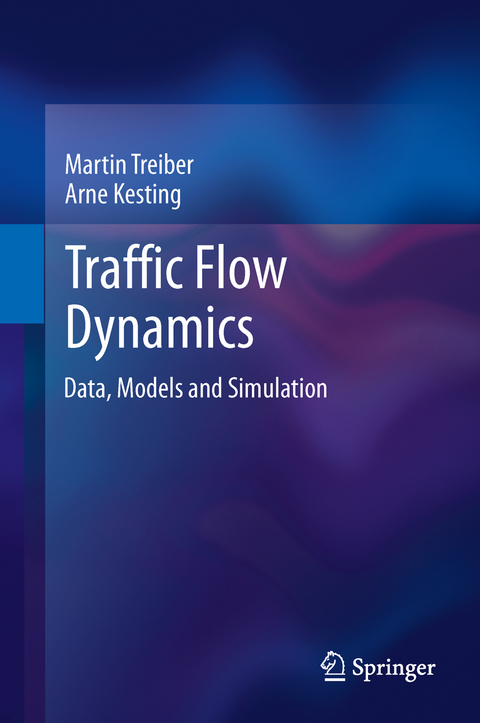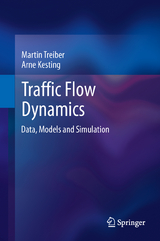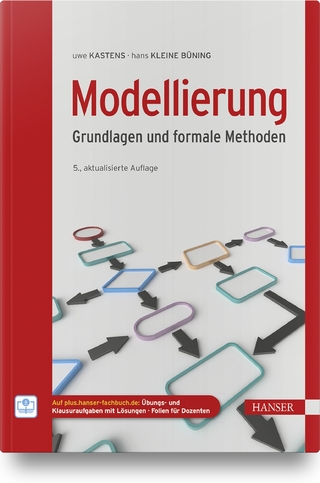Traffic Flow Dynamics
Springer Berlin (Verlag)
978-3-642-32459-8 (ISBN)
This textbook provides a comprehensive and instructive coverage of vehicular traffic flow dynamics and modeling. It makes this fascinating interdisciplinary topic, which to date was only documented in parts by specialized monographs, accessible to a broad readership. Numerous figures and problems with solutions help the reader to quickly understand and practice the presented concepts. This book is targeted at students of physics and traffic engineering and, more generally, also at students and professionals in computer science, mathematics, and interdisciplinary topics. It also offers material for project work in programming and simulation at college and university level.
The main part, after presenting different categories of traffic data, is devoted to a mathematical description of the dynamics of traffic flow, covering macroscopic models which describe traffic in terms of density, as well as microscopic many-particle models in which each particle corresponds to a vehicle and its driver. Focus chapters on traffic instabilities and model calibration/validation present these topics in a novel and systematic way. Finally, the theoretical framework is shown at work in selected applications such as traffic-state and travel-time estimation, intelligent transportation systems, traffic operations management, and a detailed physics-based model for fuel consumption and emissions.
Martin Treiber received his diploma (M.Sc.) and doctoral (Ph.D.) degree in physics in 1996 from the University in Bayreuth, Germany. He is a lecturer at the Chair for Traffic Modeling and Econometrics at the University of Technology in Dresden, Germany and runs the web-site www.traffic-simulation.de. His research interests include vehicular traffic dynamics and modeling, traffic data analysis and state estimation, and the study of macroeconomic impacts of motorized individual traffic.
Arne Kesting received his diploma (M.Sc.) in physics in 2002 from the Free University of Berlin, Germany, and a doctoral (Ph.D.) degree in 2008 from the University of Technology in Dresden, Germany. In 2009, he received the IEEE ITS Best Ph.D. Dissertation Award for the thesis "Microscopic Modeling of Human and Automated Driving: Towards Traffic-Adaptive Cruise Control". His research interests include microscopic traffic simulation, advanced driver-assistant systems, and car-to-car communication.
Introduction.- Part I Traffic Data: Trajectroy and Floating-Car Data.- Cross-Sectional Data.- Representations of Cross-Sectional Data.- Spatiotemporal Reconstruction of the Traffic State.- Part II Traffic Flow Modeling: General Aspects.- Continuity Equation.- The Lighthill-Whitham-Richards Model.- Macroscopic Models with Dynamic Velocity.- Elementary Car-Following Models.- Car-Following Models based on Driving Strategies.- Modeling Human Aspects of Driving Behavior.- Cellular Automata.- Lane-Changing and other Discrete-Choice Situations.- Stability Analysis.- Calibration and Validation.- The Phase Diagram of Congested Traffic States.- Part III Applications of Traffic Flow Theory: Traffic Flow Breakdown and Traffic-State Recognition.- Travel Time Estimation.- Fuel Consumption and Emissions.- Model-Based Traffic-Flow Optimization.- Solutions to the Problems.
"The contents of the book are exactly as its title suggests, written by authors currently working at the forefront of traffic flow dynamics research and development. ... I recommend Traffic Flow Dynamics: Data, Models and Simulation as a very thorough textbook and reference for those in the transportation sciences field. I especially appreciate the long lists of references and recommended readings as well as the companion, open-source, traffic simulation software, videos and examples." (Jon W. Mooney, Noise Control Engineering Journal, Vol. 65 (2), March-April, 2017)
"Traffic Flow Dynamics is divided into three parts. The first part is devoted to discussing highway traffic data. ... In the second part of the book, the authors describe almost all the important achievements in the field ... . The final part of the book applies traffic-flow theory to solving traffic jams ... . it will be a useful guide for students who want to make the jump into a fascinating area of research." (Katsuhiro Nishinari, Physics Today, March, 2014)
| Erscheint lt. Verlag | 11.10.2012 |
|---|---|
| Übersetzer | Martin Treiber, Christian Thiemann |
| Zusatzinfo | XIV, 506 p. |
| Verlagsort | Berlin |
| Sprache | englisch |
| Maße | 155 x 235 mm |
| Gewicht | 900 g |
| Themenwelt | Mathematik / Informatik ► Informatik ► Theorie / Studium |
| Naturwissenschaften ► Physik / Astronomie ► Theoretische Physik | |
| Naturwissenschaften ► Physik / Astronomie ► Thermodynamik | |
| Schlagworte | Car-Following Models • Complexity • fuel consumption • macroscopic models • Straßenverkehr • Traffic Flow Theory • Traffic Simulation • Traffic State Estimation |
| ISBN-10 | 3-642-32459-2 / 3642324592 |
| ISBN-13 | 978-3-642-32459-8 / 9783642324598 |
| Zustand | Neuware |
| Haben Sie eine Frage zum Produkt? |
aus dem Bereich




